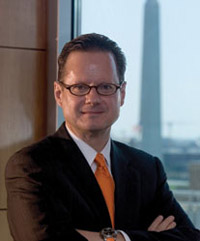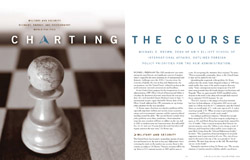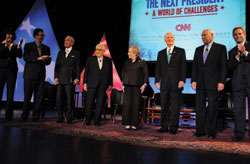Charting the Course
Michael E. Brown, dean of GW’s Elliott School of International Affairs, outlines foreign policy priorities for the new administration.
By Jamie L. Freedman
The 2008 presidential race ranks among the most historic and significant contests of modern times—capped by the most daunting set of international and domestic challenges since the 1930s. Concerns about the economy, al-Qaida, the wars in Iraq and Afghanistan, the environment, and the United States’ political standing in the world dominate national conversations and headlines.
As the United States prepares for the inauguration of a new administration, GW’s Elliott School of International Affairs is a leading the discussion of pivotal issues facing the new president. At a well-attended Alumni Weekend event on Sept. 27, international security expert Michael E. Brown, dean of the Elliott School, addressed the GW community on top foreign policy priorities for the next president.
Dr. Brown argues that three sets of policy problems will be especially important: military and security issues; economic, energy, and environmental concerns; and the nation’s political standing around the globe. “We can and should examine these policy problems across three timeframes—from immediate issues the next president will have to address on day one and in 2009, to medium-term and long-term issues that will unfold five, 10, 20, and even 50 years down the road, but which will require action in the near term,” Dr. Brown says.
Military and Security
The United States has focused a tremendous amount of attention and resources on the wars in Iraq and Afghanistan, but it is missing the mark on the number one security threat to the country, according to Dr. Brown. “Nuclear terrorism will be the top threat to U.S. national security in 2009 and for years to come. It’s not getting the attention that it requires,” he states. “This is a potentially catastrophic threat to the United States. It must not be pushed to the side.”

Michael E. Brown is dean of the Elliott School of International Affairs and professor of international affairs and political science. He is an expert in international security, conflict and conflict resolution, and U.S. foreign and defense policy.
Julie Woodford
Quantifying the magnitude of the problem, Dr. Brown explains that the atomic bombs dropped on Japan in 1945 were much smaller than many of the nuclear weapons that exist today. “Some contemporary nuclear weapons are 10 to 100 times more powerful than the bombs dropped on Hiroshima and Nagasaki. There are approximately 30,000 assembled nuclear weapons in the world today, along with enough fissile material for an estimated 250,000 weapons,” he says.
“The U.S. response to the dangers of nuclear terrorism has been far from adequate. A September 2008 report card, issued as a follow-on to the 9-11 Commission, gave the United States an overall grade of ‘C,’ with some aspects of U.S. policy receiving a grade of ‘D.’ When it comes to preventing nuclear terrorism, Cs and Ds aren’t nearly good enough.”
According to published estimates, Pakistan has enough fissile material for 30 to 50 nuclear weapons and perhaps as many as 100, and North Korea has enough fissile material for 8 to 10 bombs. “I find it deeply worrying that Pakistan has nuclear weapons, since the Taliban is very strong in parts of Pakistan, and Osama bin Laden and his senior leaders are most likely living along the Pakistan/Afghanistan border,” he states. “The acquisition of nuclear weapons by al-Qaida supporters must be prevented at all costs. This critical issue must be elevated to the top of the next president’s list of priorities. We must keep our eye on the ball. We must keep our eye on the bomb.”
Turning his attention to Iraq, Dr. Brown says, “The security situation in Iraq has started to stabilize, which is good news. Violence is down 80 percent and al-Qaida operatives in Iraq are on the run, but much remains to be done in terms of political reconciliation and economic reconstruction.”
Unfortunately, the situation in Afghanistan is “bad and deteriorating,” he continues. “The Taliban is gaining ground. A multi-dimensional effort is needed along the lines of what has taken place in Iraq.”
Looking further down the road, Dr. Brown observes that rebuilding the U.S. military after the strains of recent years and tackling regional issues in the Middle East and Asia will merit increased presidential attention. “The United States should try to make progress toward an Israeli-Palestinian peace agreement. This won’t be easy, given that the conditions for a settlement are not encouraging in the near term, but the effort must be made,” he says.
The rise of China and Chinese military power also will be important issues over the next several decades, Dr. Brown says. “China’s continued development will be important not just economically, but in the military arena as well. In addition to addressing immediate policy problems, the next U.S. president must be mindful of these longer-term strategic developments.”
Economy, Energy, and Environment
Over the past 100 years, the world has experienced profound changes in the interconnected set of issues relating to the global economy, energy use, and the environment, Dr. Brown says. One of the driving forces in this area is population growth. The world’s population quadrupled in the 20th century, from 1.6 billion people to 6 billion people, and will probably rise to 9 billion by 2050. This rapid population growth has been accompanied by tremendous economic and industrial development. “The global economy has doubled since 1990 and could double again by 2030,” Dr. Brown says. “Hundreds of millions of people around the world are being lifted out of extreme poverty, which is an important, positive development.”
At the same time, one major implication of that tremendous growth is increased energy consumption. “Over the 20th century, energy use increased by a factor of 16. Looking ahead to the year 2030, energy use could rise by 50 percent or more,” Dr. Brown states. “If current trends continue, at least 80 percent of this increase will come from fossil fuels, which has serious environment implications. Although much of the environmental damage will be in the medium and long term, immediate action is required to ward it off.”
Dr. Brown says that the new administration will of course have to focus on the country’s financial and economic crisis. “When the five former secretaries of state spoke at GW on Sept. 15, James Baker identified three structural imbalances in the U.S. economy that must be addressed by the next administration—the fiscal deficit, the trade deficit, and the weak dollar,” Dr. Brown says. “The United States must get its economic house in order, both for the well-being of the American people and because economic strength is the foundation of U.S. national power.”
Transforming the nation’s energy policy will be another priority. “The United States is transferring staggering amounts of money out of the country to pay for its energy needs, and this has to stop. A lot of this money is going to adversaries and autocracies, which strengthens the former and props up the latter. This is not in the U.S.’s best interest,” Dr. Brown states.
An important first step is to reduce U.S energy consumption, along with its reliance on fossil fuels. “The United States has 3 percent of the world’s population, and it consumes 25 percent of the world’s energy,” Dr. Brown says. “The United States needs to begin the process of transforming its energy production and energy consumption system. This means investing in and relying increasingly on renewable energy sources. It’s a multi-decade project, but the United States must get started on it now.
World Politics
The United States experienced a tremendous outpouring of international support following the Sept. 11, 2001, terrorist attacks. “On September 12, 2001, the French newspaper Le Monde declared ‘We are all Americans.’ For the first time in history, NATO invoked Article V of the Washington Treaty and declared the attacks on the United States an attack on every member of the alliance,” Dr. Brown says.
Seven years later, “International regard for the United States is now at an all-time low,” Dr. Brown states. According to a recent PEW Global Attitudes Survey, 60 percent of the people of Pakistan and 70 percent of Turkish respondents view the United States as an enemy, and more than half the people of France, Germany, and Spain hold unfavorable views of the United States.
Brown believes the reversal in the United States’ standing is due mainly to the Bush administration’s decision to invade Iraq and its subsequent handling of the war in Iraq, along with its policies on Guantanamo, torture, and extraordinary rendition. “These actions have done tremendous damage to America’s reputation,” he says.
“The next president must take direct, immediate steps to restore the U.S.’s political standing in the world,” Dr. Brown says. “This is not just a matter of being liked. If the United States isn’t respected, it will not be able to lead. This will be bad for the United States and bad for the world. American leadership will be needed on many important international issues in the years ahead.
“The good news is that many of the fundamentals of U.S. national power are strong compared to other powers,” Dr. Brown concludes, referring to demographic trends, innovativeness, research and development, and higher education as examples of American strengths. “Many of the U.S.’s current problems are self-inflicted policy mistakes, and these mistakes can be corrected....If this happens, I am optimistic that the United States will continue to be not just an important power but a truly great power in the 21st century.


